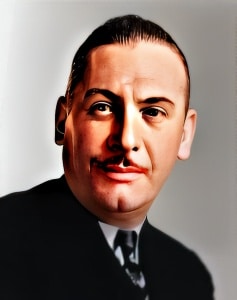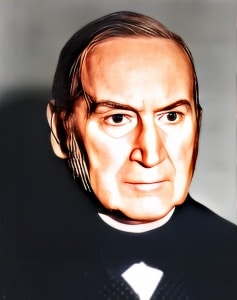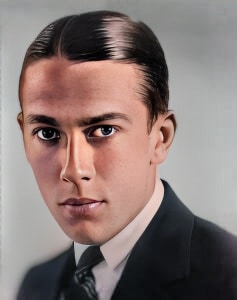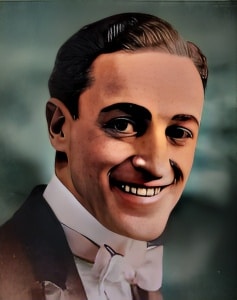 Lew Cody (1884-1934) was an American stage and screen actor known for his contributions to the early years of American cinema.
Lew Cody (1884-1934) was an American stage and screen actor known for his contributions to the early years of American cinema.
Born as Louis Joseph Côté on February 22, 1884, in Waterville, Maine, he achieved fame during the silent film era and transitioned successfully into sound films. Cody’s career was marked by his dashing good looks, versatility as an actor, and his ability to excel in both dramatic and comedic roles.
Cody began his career on the stage before making the transition to silent films. His striking appearance and commanding presence quickly captured the attention of film producers, leading to a successful career in Hollywood. He made his film debut in the early 1910s and soon became known for his leading-man status.
One of his notable early roles was in the 1915 silent film “Zaza,” directed by Edwin S. Porter. In this drama, Cody portrayed Bernard Dufresne, a key character in the story. His performance in this film and others helped establish him as a prominent actor in the silent film industry.
As the film industry transitioned to sound in the late 1920s, many silent film actors faced challenges in adapting to the new medium. Lew Cody, however, successfully made the leap to sound cinema, continuing his acting career in films with spoken dialogue.
One of his sound film appearances was in the 1930 film “Hook, Line and Sinker,” a comedy directed by Edward F. Cline. Cody played the role of Richard Mowe, a character central to the film’s humorous plot.
Lew Cody’s career in the early days of Hollywood was characterized by his versatility. He could convincingly play a range of roles, from dashing leading men to charming comedic characters. His dapper appearance and charisma made him a sought-after actor during a time when the film industry was rapidly evolving.
While he may not be as widely recognized today as some leading stars of his time, Lew Cody’s contributions to the early years of American cinema are remembered as an important part of Hollywood’s history. His ability to adapt to changing technologies and his talent as an actor marked him as an influential figure in the film industry during a transformative period.
Tragically, Lew Cody’s life was cut short. He passed away at the age of 50 on May 31, 1934, due to complications from pneumonia. His untimely death marked the end of a career that played a crucial role in the early development of American cinema.
Lew Cody’s legacy lives on through his films and his contributions to early American cinema. His work is remembered as a testament to the charm and charisma of early Hollywood leading men. Cody’s ability to excel in both silent and sound films showcases his adaptability and enduring appeal.
Loading live eBay listings...




